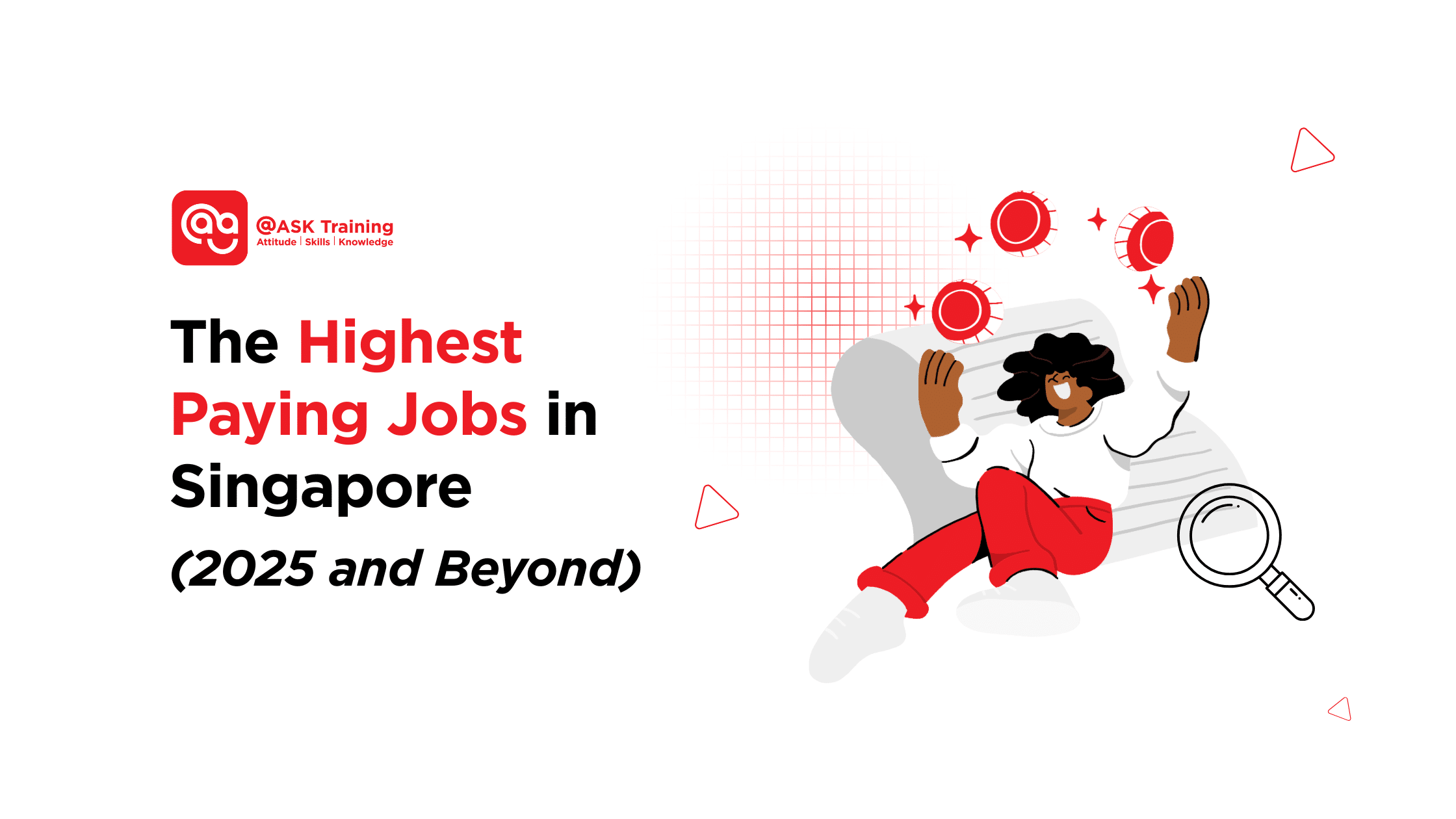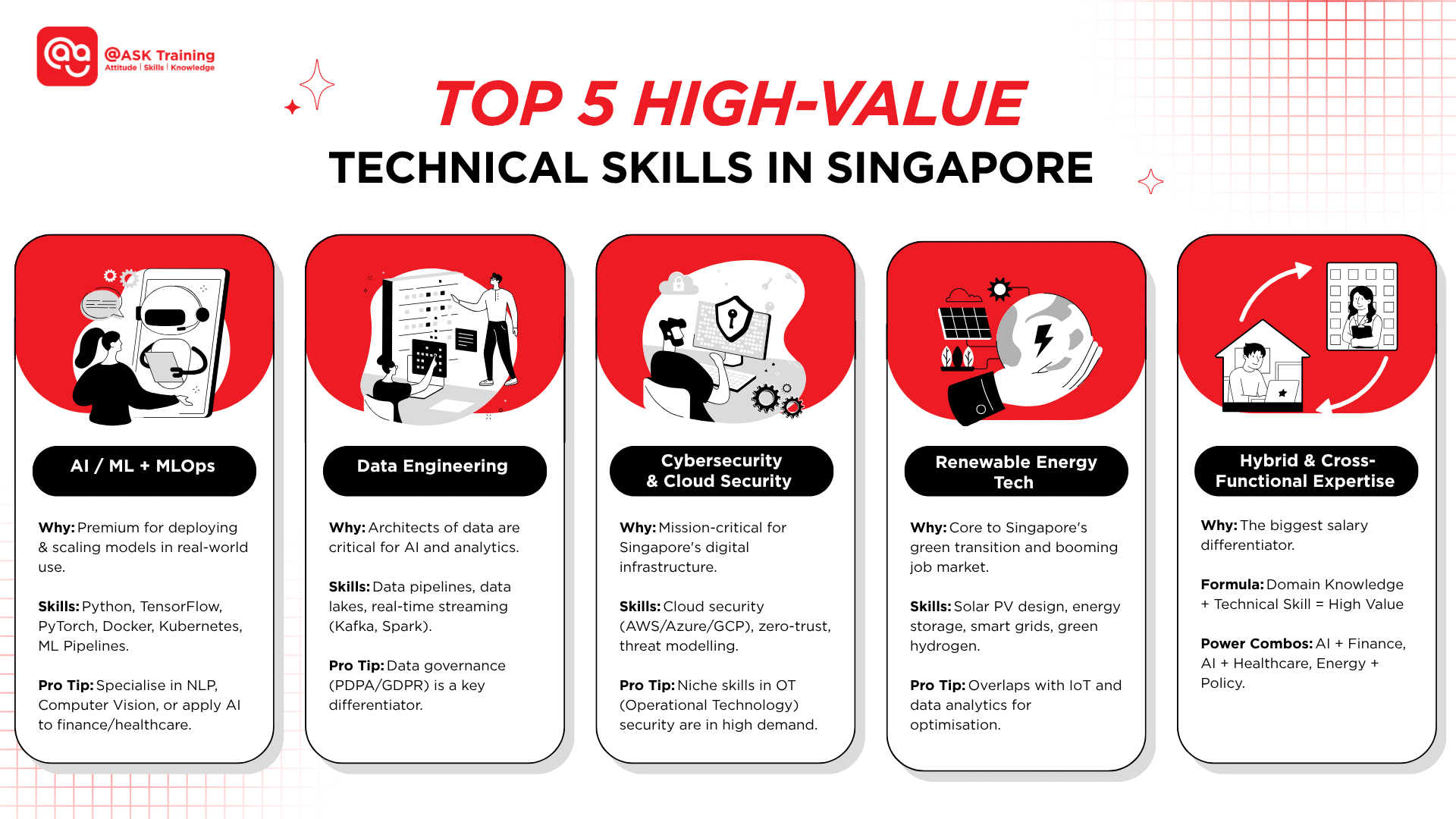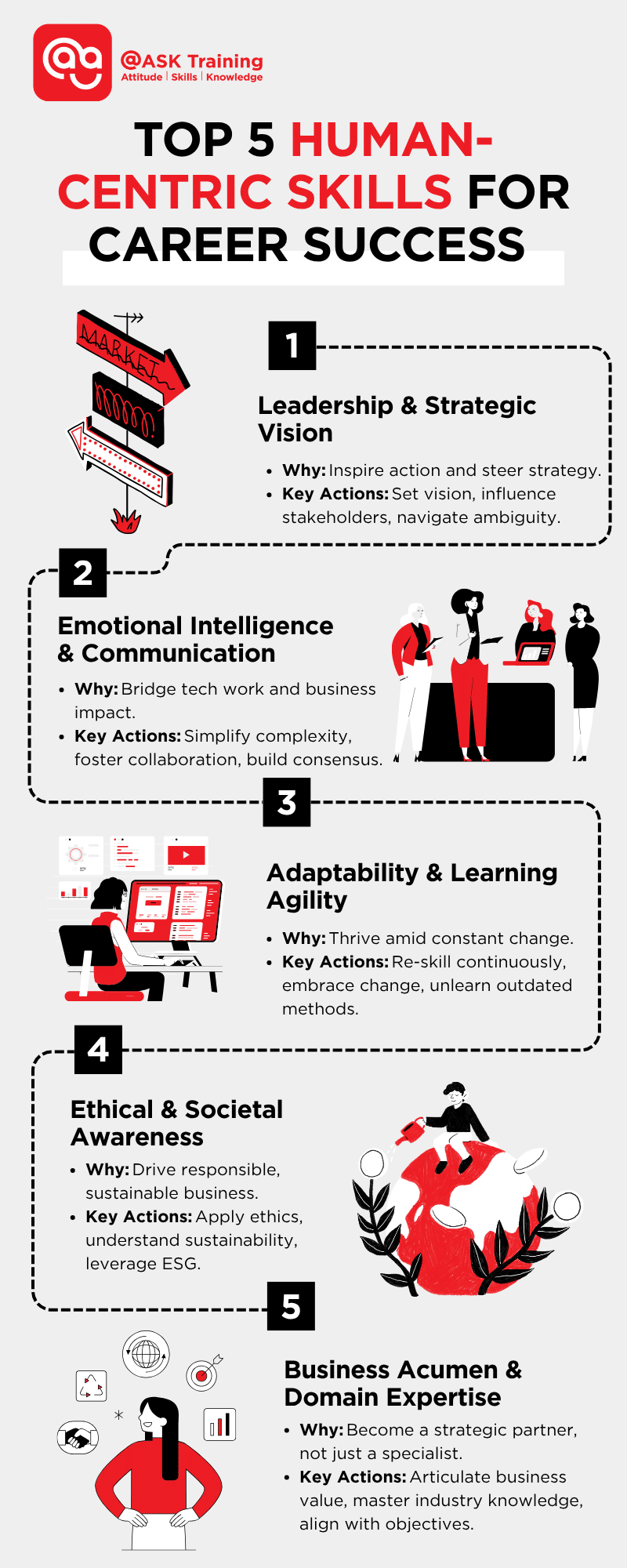
In 2025, a high-paying job in Singapore is not just about earning more than average — it’s about outearning peers in growing, high-stakes sectors, handling complexity, leadership responsibilities, or highly technical work.
For most mid-career professionals, that means salaries in the ballpark of S$90,000 to S$250,000+ per annum, depending on role, experience, company, and speciality.
Singapore is investing heavily in driving up these salary ceilings, as part of a strategy around AI, sustainability, healthcare improvements, and maintaining its edge as a global business, financial, and innovation hub. Key sectors delivering the highest salaries are:
- Technology (especially AI/ML, data, cybersecurity, cloud)
- Healthcare, particularly specialist medicine and medical technologies
- Renewable energy / Clean tech / Sustainability
- Executive leadership / Corporate functions
This article will provide the insights you need: what are the top roles and their salary ranges, which technical and human-centric skills unlock them, and what emerging trends are reshaping these opportunities.
Most importantly, we will outline a clear, strategic pathway, whether you are a mid-career professional, job-seeker, or recruiter, to not just aim for these roles but to securely future-proof your career in an evolving market.
To navigate this landscape successfully, understanding the specific salary benchmarks and required skills is the essential first step.
High Paying Jobs in Singapore: Salary Benchmarks & Trends
Here’s updated, data-backed salary ranges and trends for top roles, plus projections and nuances to watch out for.
AI / ML Engineers — S$90k–170k
Premium Skills: Domain expertise (finance, healthcare), MLOps, cloud deployment.
Market Trend: Strong demand driven by cloud and edge-AI growth.
Sources:
Morgan McKinley, Mavenside Consulting
Data Science / AI-Specialised — S$100k–160k (Mid), S$120k–160k+ (AI)
Premium Skills: ML/AI specialisation, end-to-end ML pipeline capability.
Market Trend: Higher pay in regulated sectors; rising demand for real-time analytics and MLOps.
Sources:
Morgan McKinley, Mavenside Consulting
Cybersecurity & Cloud Security Leaders — S$120k–200k+, Up to S$250k+ (Architecture)
Premium Skills: OT security, cloud-native security, AI-driven defence.
Market Trend: Increased regulatory pressure, cloud migration, and talent scarcity raise salaries.
Source:
Morgan McKinley
Healthcare Specialists — S$159k–297k+ (Surgeons)
Premium Factors: Specialisation, public vs. private sector, seniority.
Market Trend: Ageing population, rising affluence, and health-tech integration boost demand.
Source:
World Salaries
Renewable Energy / Clean Tech — S$90k–130k, 150k+ (Management/R&D)
Premium Skills: Energy storage, grid integration, specialised systems engineering.
Market Trend: Clean-energy workforce projected to grow ~80% by 2032; green jobs up ~27% YoY.
Source:
Energy Market Authority
Executive Leadership / Strategy — S$200k–250k+, S$400k–700k+ (C-Suite)
Premium Factors: Bonuses, equity, profit-sharing, and regional oversight.
Market Trend: Strong demand for leaders in digital transformation and ESG strategy.
Source:
World Salaries
Additional Insights:
- The overall salary growth in Singapore for 2025 is projected at ~4.1%, with increments in high-demand tech, healthcare, and green economy sectors being notably higher.
- There is a growing trend of skill-based hiring; for many AI, tech, and green roles, demonstrable skills and portfolios are becoming as influential as formal degrees.
These figures highlight that the highest paying jobs in Singapore are in complex, rapidly evolving fields. The good news is that many are accessible through target upskilling, a pathway we will explore next.
Technical Skills That Unlock High-Pay Jobs (Deep Dive)
Mastering the right technical skills is the most direct route to a high salary in Singapore. Here, we break down not just what to learn, but why these skills are highly valued in 2025 and how they combine to make you a top candidate.
1. AI / ML + MLOps / Deployment Skills
It’s no longer enough to just build models. Employers pay a significant premium for professionals who can deploy, monitor, retrain, and scale ML systems in live production environments.
- Core Skills: Python, TensorFlow, PyTorch.
- High-Value Add-ons: Docker, Kubernetes, ML pipelines (Kubeflow, TFX), and model monitoring for performance and drift.
- Career Accelerator: Specialising in subdomains like NLP or Computer Vision, or applying AI to specific sectors like finance or healthcare. Understanding regulatory and ethical aspects like data privacy also leads to greater trust and compensation.
2. Data Engineering, Big Data & Real-Time Systems
Data scientists are only as powerful as their data. This makes Data Engineers, the architects of data pipelines, absolutely critical.
- High-Demand Skills: Building and managing data pipelines, data lakes, and real-time streaming systems using tools like Kafka and Spark Streaming.
- Key Differentiator: Skills in data governance and compliance (e.g., PDPA, GDPR) are increasingly valuable, especially for companies with international operations.
3. Cybersecurity, Cloud Security, and OT Security
With Singapore’s heavy reliance on digital infrastructure, robust cybersecurity is non-negotiable. Expertise here is a direct ticket to a high-paying career.
- Must-Have Skills: Cloud security (AWS, Azure, GCP), zero-trust architectures, threat modelling, and ethical hacking.
- Niche Premium: Skills in Operational Technology (OT) security, protecting industrial and infrastructure systems are in especially short supply and high demand.
- Leadership Path: Senior roles require experience in risk governance, incident response, and corporate compliance.
4. Renewable Energy Tech / Clean Tech Engineering
As Singapore accelerates its green transition, specialised engineering skills in the clean tech sector are becoming highly lucrative.
- Core Technical Skills: Solar PV design, energy storage systems (battery tech), smart grid integration, and green hydrogen.
- Overlapping Tech: The sector also values skills in IoT sensors, data analytics for energy optimisation, and OT security, creating unique hybrid roles.
5. Hybrid & Cross-Functional Expertise
The single biggest differentiator for top-tier salaries is the ability to bridge multiple domains.
- The Formula: Domain Knowledge + Technical Skill = High Value.
- Powerful Combinations: AI + Finance (quantitative trading), AI + Healthcare (medical diagnostics), or Renewable Energy + Policy/Regulatory Compliance.
- The Payoff: This cross-domain skillset creates roles that are less replaceable, more strategic, and consequently, more highly paid.
While technical prowess opens the door, the ability to lead, communicate, and adapt – the human-centric skills – is what allows you to thrive and lead in these high-stakes roles.
Human-Centric Skills & Contextual Intelligence
Technical skills open the door, but human-centric skills determine how far you advance. These are the essential capabilities for leading effectively, navigating complex dynamics, and securing long-term value in any high-paying role.
1. Leadership & Strategic Vision
Go beyond managing tasks to inspiring action and steering strategy.
- Setting a clear vision and influencing key stakeholders (board members, regulators, clients).
- Navigating ambiguity and making confident decisions with incomplete information.
- Interpreting broad trends (geopolitical, regulatory, climate-related) to guide organisational strategy.
2. Emotional Intelligence & Cross-Functional Communication
Bridge the gap between technical expertise and business impact.
- Translating complex concepts for non-technical audiences like senior management or clients.
- Fostering collaboration across different functions (tech, legal, finance, operations).
- Using diplomacy and empathy to build consensus and drive projects forward.
3. Adaptability, Resilience & Learning Agility
Thrive in a market where specific tools and frameworks constantly evolve.
- Continuously re-skilling to stay relevant in emerging areas like generative AI and green tech.
- Demonstrating resilience by adapting to new regulations, business models, and technologies.
- Unlearning outdated methods to embrace new, more effective paradigms.
4. Ethical / Societal Awareness & Sustainability Mindset
Meet the growing demand for responsible and sustainable business practices.
- Applying a strong ethical framework to technical and business decisions.
- Understanding environmental impact and integrating sustainability into your work.
- Leveraging knowledge in ESG or ethical AI to stand out in leadership and green energy roles.
5. Business Acumen & Domain Expertise
Transform from a specialist into a strategic business partner.
- Articulating how your work drives value through cost savings, revenue generation, or risk reduction.
- Mastering industry-specific knowledge, such as healthcare regulation or energy market dynamics.
- Aligning technical projects with core business objectives and market opportunities.
Mastering these human skills multiplies the value of your technical expertise. With both in hand, you are perfectly positioned to gain a head start on the major trends shaping the future of high-paying work in Singapore.
Emerging Trends Shaping High-Pay Roles & What They Mean for You
Beyond the specific skills, understanding these macro-trends will help you anticipate where the greatest opportunities and highest salaries will be in the coming years.
1. Green Jobs / Clean Energy Boom
Singapore is all-in on sustainability, creating a massive wave of new, high-value careers.
- Massive Growth: The clean energy workforce is projected to grow ~80% by 2032. (Source: EMA)
- Surge in Hiring: “Green jobs” saw a 27% Year-on-Year growth in early 2025, especially in engineering and strategy roles. (Source: ACN Newswire)
- Your Advantage: Seek roles that blend technical skills with sustainability policy, regulatory compliance, and ESG strategy.
2. Skill-Based Hiring / Softening of Degree Barriers
Formal qualifications are no longer the only path to a top salary.
- Shift in Priority: For AI and green roles, employers increasingly prioritise demonstrable skills, portfolios, and project experience over degrees alone. (Source: Oxford Internet Institute)
- New Pathways: Micro-credentials and bootcamps are becoming recognised and credible pathways to high-paying careers.
- Your Advantage: Focus on building a strong portfolio of work and obtaining industry-recognised certifications to prove your capabilities.
3. Increased Premium for Hybrid / Cross-Domain Expertise
The most valuable professionals can operate at the intersection of different fields.
- The “Hybrid” Premium: Roles that combine tech with domain knowledge (e.g., AI in healthcare, data in finance) are especially well-rewarded.
- Regulatory Edge: Expertise in compliance, data privacy, AI ethics, and ESG provides a significant competitive advantage.
- Your Advantage: Intentionally build skills that bridge your technical expertise with another high-value domain or regulatory field.
4. Remote Work & Global Competition
The workplace is no longer confined by geography, changing both opportunities and expectations.
- Global Opportunities: Remote work allows you to compete for roles with international firms offering higher compensation.
- New Success Metrics: Thriving in this environment requires excellent communication, self-management, and knowledge of international standards.
- Your Advantage: Look beyond base salary; equity, flexibility, and ESG-linked benefits are increasingly part of a premium compensation package.
5. Acceleration of Automation, Generative AI, and Tools
AI is not just a tool; it’s a fundamental shift in how work is done.
- New Specialisations: Proficiency with Generative AI, LLMs, and prompt engineering is rapidly becoming a core, valued skill across sectors.
- Value Shift: As automation handles routine tasks, human skills in strategy, creativity, and deep domain knowledge become more crucial than ever.
- Your Advantage: Focus on developing skills that leverage AI tools and emphasise uniquely human capabilities like innovation and complex problem-solving.
Understanding these trends is the first step. The next step is building a concrete plan to acquire the right skills, which is where a strategic learning pathway becomes your most valuable asset.
Pathways & Strategies to Acquire High-Value Skills in Singapore (and Stand Out)
Knowing the destination is one thing; you need a clear map to get there. Here is your actionable plan to bridge the skills gap and position yourself for a high-paying career in Singapore.
1. Map Your Target Role & Conduct a Gap Analysis
Start with a clear target to focus your efforts effectively.
- Identify 2-3 high-paying roles you aspire to (e.g., Senior AI Engineer, Cybersecurity Architect, Clean Energy Project Manager).
- Analyse current job listings for these roles, noting down both the technical and soft skill requirements.
- Compare these requirements against your current skill set to identify your specific knowledge and experience gaps.
2. Leverage SkillsFuture & Local Institutions
Singapore’s ecosystem provides extensive support for upskilling.
- Tap into national initiatives: Use SkillsFuture credits, the TechSkills Accelerator (TeSA), and programmes by AI Singapore and SGInnovate for subsidised, industry-relevant training.
- Seek real-world experience: Look for programmes that offer apprenticeships or project attachments to gain practical, hands-on experience.
- Monitor green grants: Follow new government grants in areas like green tech and energy storage, which often include funding for associated training.
3. Pursue Certifications with a Practical Focus
Choose credentials that prove your competency to employers.
- Select high-impact certifications: Focus on credentials valued in your target field, such as cloud platforms (AWS, Azure, GCP), cybersecurity (CISSP, CISM), or MLOps.
- Prioritise hands-on learning: Ensure the certification programme includes practical projects, real-world business cases, or a capstone project to demonstrate applied skills.
4. Build a Project-Based Portfolio
Showcase your skills by creating a tangible record of your capabilities.
- Develop a public profile: Use GitHub or Kaggle to display projects that solve real-world problems, especially those with domain relevance like finance, healthcare, or energy.
- Gain experience through challenges: Participate in hackathons and innovation challenges to test your skills, build your network, and enhance your resume.
5. Engage in Networking & Cross-Functional Mentorship
Your network and exposure are critical accelerators for your career.
- Join professional bodies: Become a member of groups like the Singapore Computer Society, Institute of Engineers Singapore, or sustainability networks.
- Find a mentor: Seek guidance from professionals already in your target roles.
- Volunteer for cross-functional projects: Step outside your comfort zone by working with teams from different departments (e.g., legal, operations, sustainability) to build credibility and broader business acumen.
6. Commit to Continuous Learning & Market Awareness
The landscape evolves quickly; staying informed is non-negotiable.
- Monitor industry trends: Regularly follow updates on technology, regulatory changes, and energy policy.
- Benchmark your salary: Use guides from Morgan McKinley, Robert Half, and Hays, as well as reports from SkillsFuture Singapore (SSG), to understand your market value and when to negotiate.
With a clear plan in place, the final step is to adopt the mindset that will propel you from planning to action and achieving lasting career success.
What You Must Do to Shift Perspective & Spur Action
To go beyond passive reading and actually change your trajectory, here are mindset & action shifts that make the difference:
1. Own your learning roadmap
- Take charge of your professional development instead of waiting for company-sponsored training.
- Define clear 6-month and 12-month upskilling priorities, such as mastering cloud security or building a project prototype.
2. Track outcomes, not credentials alone
- Go beyond listing certificates on your resume.
- Quantify your achievements by demonstrating how you applied new skills—for example, by deploying a model that improved efficiency or implementing a solution that reduced costs.
3. Look for intersection areas
- The highest premiums are often found where fields merge.
- Actively build skills that bridge domains such as AI + Healthcare, Cybersecurity + Operational Technology, or Renewable Energy + Policy.
4. Prepare for leadership early
- Don’t wait for a formal title to act like a leader.
- Seek opportunities to mentor juniors, propose cross-team initiatives, lead workshops, or manage project budgets to build experience ahead of responsibility.
5. Be strategic about employer choice
- Align your career with companies driving transformation in sectors like green tech, health tech, and ESG-focused fintech.
- Evaluate total compensation, including equity, bonuses, and profit-sharing, not just the base salary.
Wrapping Up
The landscape for high-paying jobs in Singapore is clearly defined by technology, sustainability, and leadership. To secure your future in this dynamic market, internalise these key takeaways:
- Salary Benchmarks: Top roles in growth sectors typically offer between S$90,000 and S$250,000+ annually.
- Leading Sectors: The highest salaries are concentrated in AI/ML & tech, cybersecurity, specialist healthcare, renewable energy, and executive leadership.
- Critical Skills: Success requires a powerful combination of in-demand technical skills (AI deployment, cloud security, clean tech) and human-centric skills (leadership, business acumen, adaptability).
- Key Trends: The rise of green jobs, the shift to skill-based hiring, and the premium placed on hybrid expertise are reshaping opportunities.
Your Call to Action: Future-Proof Your Career Now
- Benchmark Yourself: Download the latest salary guides from Morgan McKinley, Robert Half, or Hays to understand your market position.
- Define Your Target: Choose one high-value role you want in 3–5 years and conduct an honest gap analysis.
- Start Your Upskilling Journey: Register for a course or bootcamp that directly addresses your highest-priority skill gaps, such as MLOps, cloud security, or energy modelling.
- Build tangible proof: Start a project, contribute to an open-source initiative, or seek a leadership opportunity to create demonstrable outcomes.
- Stay Agile: Continuously monitor industry trends in green tech and AI to remain adaptable and relevant.
Ready To Move from Planning to Action?
At @ASK Training, we offer industry-aligned courses and expert guidance you need to build these high-value skills.
Explore our wide range of courses from Digital Marketing and IT to Microsoft Office that are eligible for SkillsFuture funding and to utilise your SkillsFuture Credit.
Alternatively, if you’re considering a career switch, explore our SkillsFuture Career Transition Programme (SCTP) and discover how you can upskill, reskill, and transition into a new industry with confidence.
Take the decisive first step toward leading the future of your industry! Get in touch with us to learn more about which courses catch your interest!
Related Courses
- Cybersecurity Essentials
- WSQ Generative AI for Digital Marketing
- Cloud, Automation & Emerging Tech Courses
◆◆◆
Related Articles
Article Topics
- High Paying Jobs in Singapore: Salary Benchmarks & Trends
- Technical Skills That Unlock High-Pay Jobs (Deep Dive)
- Human-Centric Skills & Contextual Intelligence
- Emerging Trends Shaping High-Pay Roles & What They Mean for You
- Pathways & Strategies to Acquire High-Value Skills in Singapore
- What You Must Do to Shift Perspective & Spur Action
- Wrapping Up


